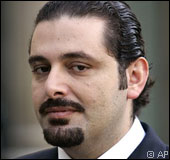 WASHINGTON – Lebanese parliament member Saad Hariri, son of slain prime minister Rafic Hariri, expressed interest in seeing the U.S. send equipment to help Lebanon protect its borders.
WASHINGTON – Lebanese parliament member Saad Hariri, son of slain prime minister Rafic Hariri, expressed interest in seeing the U.S. send equipment to help Lebanon protect its borders.
Speaking to a crowd of 150 and nearly a dozen TV cameras, Hariri, named to Forbes’ list of the World’s Richest People, also mentioned he aims to discuss this and other issues–including the investigation into his father’s death–with President Bush during a three-day visit to Washington. The pit stop follows meetings earlier in January with French President Jacques Chirac and U.S. Vice President Dick Cheney during his Middle East tour focused on the Lebanon-Syria crisis and regional security.
Hariri has lived for the past few months in a self-imposed exile in Saudi Arabia, where he holds dual citizenship and lives off a $1.25 billion fortune. Saudi Arabia is also the headquarters for Saudi Oger, a $3.25 billion (sales) construction and telecommunications company that employs 38,000 and was led by Hariri until his political career took off last year.
This morning’s remarks coincided with a report published today by Moody’s Investor Service dropping Lebanon’s credit rating to below investment grade–as "B3/ Not Prime foreign currency bond and bank deposit ratings, with stable outlook."
The World Bank last month approved a program to lend Lebanon $100 million to $700 million between 2006 and 2009 to help the country meet economic challenges as it makes the transition from three decades of Syrian domination. Lebanon plans to host an international aid conference early this year aimed at easing a public debt of around $37 billion.
Meantime, investors in Lebanon’s stock market continued to be bullish on Solidere, a real estate development company, sending shares to record highs. Solidere "A" shares closed at $ 24.54 and "B" shares at $ 24.70. The Global Depository Receipts of BLOM Bank (Banque du Liban et d’Outre-Mer), owned partially by the Bank of New York, went up 1.50% to close at $ 98 even.
"We have to rebuild the country from scratch," Hariri told his audience. Will he work with the organization Hizbullah, which won 30 seats in parliament last summer, in that rebuilding process? “Hizbullah won a big bloc and was part of the elections,” Hariri said. “We need to have a national dialogue.”
A much softer response than the one offered David Welch, U.S. assistant secretary of state for Near Eastern affairs, who said recently in an interview with a Lebanese TV station that he did not believe Hizbullah should participate in the Lebanese government.



